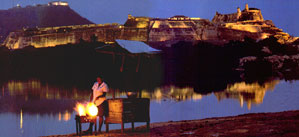- First hint of dawn finds a
- fritanguera, or food ven-
- dor, stoking the fire of her
- grill. Across the lagoon
- looms the fort of San
- Felipe de Barajas, monu-
- ment to the might of the
- empire that directed Car-
- tagena´s destiny for near-
- ly three centuries.
|
- almond leaves, whipping up whitecaps. Winds that
- once filled the sails of galleons now deliver the city a
- daily second wind.
- Shoeshine boys near the old clock gate fold up their
- kits. Codgers sit on park benches donated by politi-
- cians; stencils promise "deeds not words." The buy-
- ers of lottery tickets visit their bookies at El Perro to
- collect winnings or consolation.
- On the Street of the Consulado, I visit a man
- described ed as a curer, a sorcerer, or, as he prefers,
- a "spiritual counsel." His copra-scented office is
- crowded with jars and one human skull. For some 40
- years Jesús Meza has fashioned amulets and come to
- know his neighbors in a special way: "Other towns
have more culture. But people here have the instinct
for happiness."
- And in an instinct for history. A disparate crowd
of
- men-courtly, phlegmatic, young, old-meet as
- members of the Society of Public Improvements.
- They are preservationists and historians, here to take
- refreshments, plan city projects, and quarrel politely.
- The dean is clearly Don Donaldo Bossa Herazo, a
- white-clad, white-haired octogenarian, big as a
- Buddha. He speaks about fortifications and dates:
- "Remember what Arnold Toynbee said when he saw
- our walls: "South America does not speak English
- because of this!"
- One member mentions "the matter of flowers
|
